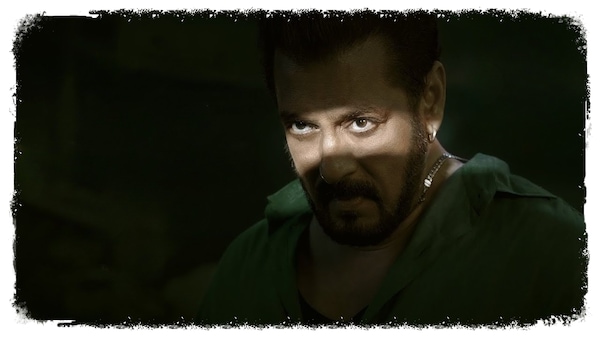Sikandar Is The Quintessential Salman Khan Eid Film. Is That A Good Thing?
Watching a Salman Khan film today has come to resemble an act of parental bias as if he were an irate child and the rest of us exist to humour him, writes Ishita Sengupta.

Last Updated: 05.26 PM, Mar 30, 2025
A SALMAN KHAN FILM has come to mean certain things: it arrives on Eid, it abstains from intimacy, it extends the actor’s legacy of goodwill, it insists on pairing him opposite someone at least two decades younger, and resists making any demands of acting from Khan. In the last couple of years, there have been multiple renderings of this formulaic outline (Bodyguard, 2011; Radhe, 2021); a doubling down on this blueprint with Kisi Ka Bhai Kisi Ki Jaan (2023) whilst also sneaking in another rule: he will not try anymore, pushing the bar to the floor. The upshot of this is that a Salman Khan film can no longer disappoint, it can only impress. The sole way to go is up.
As a result, the audience is conditioned to expect nothing and believe everything. Khan wore a jacket mid-air in Kisi Ka Bhai and lip-synced leisurely in Tiger 3 (freely skipping most words). His reluctance to strive is so deep that even an ounce of effort on his part draws cheer. He moves his body and you commend his flexibility. He cries in a scene and you compare him to Robert De Niro. Watching a Salman Khan film today has come to resemble an act of parental bias as if he were an irate child and the rest of us exist to humour him.
In his latest release Sikandar, directed by AR Murugadoss, there are plenty such instances. The obvious checkpoints are ticked: it is an Eid release, the film centres on a bizarre threadbare plot of him helping people as though his life depended on it, and cast opposite him is the three-decades-younger Rashmika Mandanna. But Khan also decides to try. He snaps his fingers to halt a crowd of goons, he ducks his head to avoid being stabbed in the stomach, he cries at least thrice (unsuccessfully) and in an oddly curious moment, wriggles his hands out of his coat to punch a man. He moves.

Make no mistake. None of these land because it is painful to watch Khan. His face does not emote and he utters lines with regular pauses like checking with an invisible teleprompter. His act is laboured and he looks exhausted. But in the strange gradation created by and for his films, his latest refuses to be hurled to the bottom — a spot already occupied by many of his other films. At most, Sikandar is better than Kisi Ka Bhai. It is still very, very bad.
Sanjay Rajkot (Khan), the king of Rajkot, is a do-gooder. He is always helping everyone and happily thrashing the wicked. One of them turns out to be Arjun Pradhan (a bonkers Prateik Babbar), the son of Minister Pradhan (Sathyaraj); Sanjay encounters Arjun on a flight as the latter misbehaves with a woman. Five broken bones later, they both go their own way except the video goes viral. Here’s what happens next: Arjun, a grown-up man, throws a fit to his father fearing no one will fear him anymore (that is his worry), a cop is sent to arrest Sanjay and the latter’s wife, Saisri (who else but Rashmika Mandanna, the in-house ally of patriarchy) sends some texts, and soon a crowd assembles outside the police station. Looking at them wistfully, a constable shares that all of them are Sanjay’s beloved ‘subjects’.
It should be amply clear by now that neither the story nor the actors are Sikandar’s strongest suit. Written by Murugadoss, the film goes the Ghajini way (the 2008 thriller by the same filmmaker) where the death of a beloved drives the protagonist to revenge. Except in this case Saisri’s death segues into an outlandish plot of organ donation (she donated them to safeguard her husband; don’t ask) and Sanjay, wracked with guilt and a kink for sorrow, arrives in Mumbai to meet the recipients and meddle in their lives.

Baffling ethics aside, there are stranger things at play: Although a king, Sanjay takes a train; although living in this economy, he always carries a bag full of cash; although he had so much work earlier that he overlooked his wife, Sanjay keeps staying in Mumbai and away from Rajkot like he has started paying rent. It is all too bizarre and if the idea was to lend an emotional subtext to the fighting in the second half then a different actor would have been better.
Khan looks awkward in the emotional scenes, disinterested in the songs and musters some interest only in the action sequences. Even those keep getting interrupted by the appearance of Saisri’s ghost (the visual design is heavily inspired from Aditya Chopra’s Mohabbatein) which makes him look bored again. But even as an action star, Khan has become less agile compared to, say, his contemporary Shah Rukh Khan. His physicality, propulsive in the past, appears to be a hindrance now and his bracelet does most of the heavy lifting. Murugadoss lacks Atlee’s finesse or Siddharth Anand’s flourish of background music, and in the absence of such embellishments, Khan visibly struggles.
But there is something to be said about the coarseness of Sikandar. It is so old-world that it makes one nostalgic. Granted Khan speaks in Gujarati and the post of the evil minister is beeped but largely Sikandar wilfully stays away from the current trappings of jingoism, patriotism, state worship et al which most action thrillers are susceptible to. The film feebly tries making commentaries on alpha males and the patriarchy (ironic since Khan’s entire career rests on these) and the actor looks confused spouting the lines…like he is one breath away from disagreeing. But more crucially, he sticks to his lane with his new film, and in this cowardly new world, it is not the worst thing. In fact, Sikandar is as good as 2014’s Jai Ho.
Disclaimer: The views expressed in this column are those of the author and do not necessarily reflect the official policy or position of OTTplay. The author is solely responsible for any claims arising out of the content of this column.

 Premium
Premium